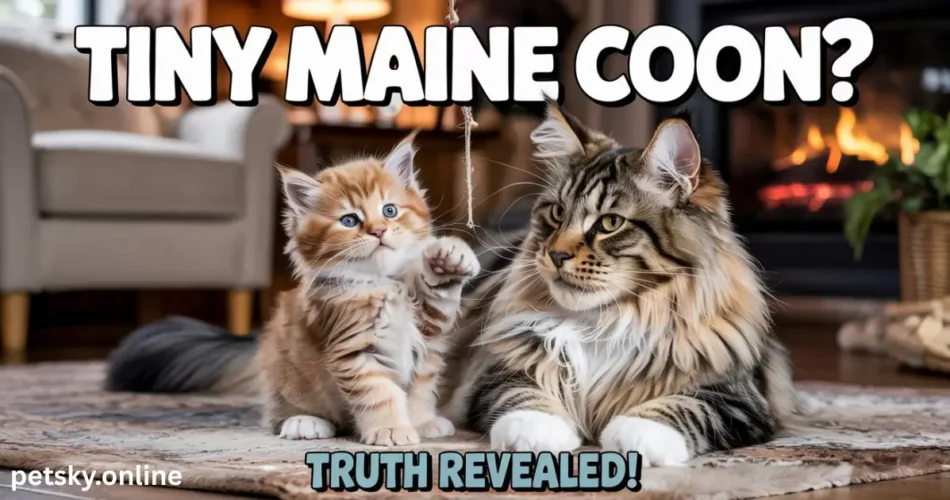Introduction: Are Maine Coon Cats Always Big?
The Maine Coon selection is generally recognized for its extraordinary size character. Many people believe Maine Coons are always enormous cats yet it remains possible to find smaller individuals from this breed. The question often asked is, can a Maine Coon be small? The answer is yes! The majority of Maine Coons exhibit large size but some can exist within smaller dimensions. The reasons behind Maine Coons being small and specific influence on their size will be examined throughout this article.
What Defines a Maine Coon Cat?
Having large dimensions makes the Maine Coon approach the measurement threshold for the biggest breed category of felines. Maine Coon cats possess lengthy abundant fur along with a full tail. Maine Coons display two prominent traits of gentle nature with friendly personality. Gentle giants remain a common description for Maine Coons because of their combination of large size and wonderful personality. The size of Maine Coons depends on two primary elements which are heredity together with environmental conditions.

Can a Maine Coon Be Small?
Maine Coons possess the ability to develop into shorter sizes among their breed. The size of Maine Coons differs from one individual to another since every Maine Coon develops differently. The size of some Maine Coons remains limited because of their genetic makeup together with nutritional elements as well as medical factors.
Maine Coons which remain small will not achieve the typical large proportions of their breed. In spite of their decreased physical size small Maine Coons maintain all the wonderful traits and personality that characterizes their breed.
Factors Affecting the Size of a Maine Coon
Several aspects determine the final size of a Maine Coon as an adult cat. Genetics play a huge role. Maine Coon kittens become smaller when their parents show reduced dimensions. Diet is another factor. The complete growth potential of a Maine Coon depends on a sufficient supply of nutritional elements when cats are developing. Maine Coons could develop differently in size because of medical health issues. Illness during growth or inherited conditions stop sick Maine Coons from achieving full-sized adult status.
How Long Do Maine Coon Cats Grow? 7 Shocking Facts
Maine Coon cats generally attain their average size
Maine Coon cats represent among the biggest domestic cat breeds that exist. Male Maine Coons reach size ranges from 15 to 25 pounds and female Maine Coons typically stay within 10 to 15 pounds. Breed standards indicate that Maine Coon cats should measure between 19-32 inches long during adulthood. The large body size distinguishes Maine Coon cats from other breeds. The final size of a Maine Coon cat depends on genetic factors along with their nutrition and their living habitat.
Size Variations Within the Maine Coon Breed
A complete uniformity in Maine Coon cat sizes does not exist. Some Maine Coons possess genes that result in their smaller body size. Most Maine Coons become large cats but their sizes vary from one cat to another. Maine Coons weigh either under 10 pounds or surpass 25 pounds in their adulthood. The traits along with personality attributes remain consistent between large and small Maine Coons.
Are Small Maine Coons Rare?
Although uncommon, Small Maine Coons do occur among the breed. Little Maine Coons continue to display the normal physical features of the breed even though they stay smaller than the average size. The overall body size of Maine Coons depends mostly on genetics as well as surrounding environmental conditions. A small Maine Coon cat does not reach standard breed size but retains all qualities which identify it as a Maine Coon including appearance and personality traits.
The Role of Genetics in Maine Coon Size
Genetic factors lead to determining what size a Maine Coon cat will reach. Maine Coon kittens have a greater chance of developing to a large size when their parents also reach large sizes. A Maine Coon kitten will tend toward a smaller size when either parent or both parents possess diminutive proportions. Similar to human inheritance patterns Maine Coons receive size-related information from their genetic make-up. Even when measuring against other Maine Coons of the same breed, genetics can determine how small a particular member of the breed becomes.
How to Identify a Maine Coon Kitten: 6 Proven Signs
Nutrition and Its Impact on Maine Coon Size
The size of Maine Coons receives considerable influence from what they eat. A Maine Coon needs proper nutrition to develop healthy body growth. Insufficient protein and vitamins as well as minerals in a cat’s diet will result in limited growth potential to its expected size. Giving your Maine Coon a nutritionally balanced diet will increase the chances of reaching its natural size proportions. Insufficient nutrition will result in health problems which impact both physical growth and general well-being of Maine Coons.
Health Conditions That Affect Maine Coon Size
Various health problems have the effect of decreasing a Maine Coon’s size. Maine Coons affected by particular diseases coupled with genetic problems tend to stay smaller compared to their healthy counterparts. Maine Coons naturally develop heart diseases which result in restricted growth since the condition prevents the cats from becoming their full size. The size of Maine Coon cats becomes restricted because of various health conditions which include nutritional deficiencies or metabolic disorders. The proper wellness of a Maine Coon should be maintained for proper growth.
Are There Differences Between Male and Female Maine Coons?
A size difference exists between male and female Maine Coons. Maine Coon males grow into larger sizes when compared to females of the breed. Maine Coon males will grow up to 25 pounds while their female counterparts stay within 15 pounds. Different cat breeds display such size differences in their male and female members. The genetic and hormonal influences on males result in their larger size yet the natural evolutionary pattern of the breed makes female Maine Coons inherently smaller.
Can a Maine Coon Be Small Due to Early Spaying or Neutering?
The size of a Maine Coon may be impacted when early spaying or neutering procedures are performed. Male and female Maine Coons can reach their full size potential if spaying or neutering occurs after they have finished reaching maturity. The hormones affected by early spaying or neutering operations create a slower growth rate in cats. Early spaying or neutering the cat does not produce extreme size reduction yet it may produce slightly reduced Maine Coon size.
The Lifespan of Smaller Maine Coons
Maine Coons who become smaller through breeding never face any effect on their average lifespan compared to their larger counterparts. Maine Coons survive on average from 12 years to 15 years. Large or small size of Maine Coons has no direct influence on their expected lifespan. Health problems stemming from reduced size might impact the life expectancy of Maine Coons even though their potential lifespans remain unaffected. The life expectancy of smaller Maine Coons remains normal when they grow up healthy and experience proper care.
Are Maine Coon Cats Aggressive? 7 Shocking Facts!
How to Tell if Your Maine Coon Will Stay Small
Predicting the permanent size of a Maine Coon becomes tricky because this determination proves challenging to evaluate early in their development. Early signs that indicate future size include their dimensions when young. The smaller size of a kitten when compared to its peers will typically persist during its development. Some Maine Coons exhibit slower growth patterns than other examples of their breed. The predicted height of any Maine Coon can be determined through observing their family members and relatives.
Can a Small Maine Coon Still Have the Maine Coon Personality?
The special Maine Coon personality characteristics exist in both big and small cats of this breed. The Maine Coon breed manifests its well-known characteristics through friendly behavior and playful demeanor and intelligent tendencies. Impressive personality characteristics do not change based on physical dimensions. The active and affectionate behavior of Maine Coons continues to exist despite any variations in their size. Regardless of their dimensions a Maine Coon maintains its friendly nature which stays unchanged.
Conclusion: Can a Maine Coon Be Small?
A Maine Coon of small size absolutely exists. The factors of genetics together with proper diet and overall health status determine whether a Maine Coon will be small instead of the normal large category. The small Maine Coon retains all the loveable qualities which bigger Maine Coons exhibit. Regardless of how large or small Maine Coons become they always maintain their friendly personality characteristics and remain excellent pets.
FAQ
Can a small Maine Coon still be considered a true Maine Coon?
A Maine Coon that displays small size can qualify as an authentic member of the Maine Coon breed. The reduced dimensions of small Maine Coons maintain definite breed characteristics consisting of long hair and a bushy tail and a friendly character. The size of a Maine Coon relates to genetics and diet plus health but such factors will never alter their breed classification.
The smallest possible size for a Maine Coon amounts to between 5-8 pounds.
A Maine Coon measures at its minimum size between 5-8 pounds. However, this is quite rare. Maine Coons typically fall within weight ranges from 10 pounds to 25 pounds. A smaller Maine Coon size normally occurs because of genealogical causes or health-related conditions. A Maine Coon no matter its size will showcase all the characteristics and personality traits typical of this breed.
A Maine Coon cat fails to grow properly because of a deficient diet.
Illness or malnutrition will prevent a Maine Coon from reaching its standard size. Failure to provide the right nutrients to a Maine Coon can prevent the cat from achieving complete size development. Maine Coons need a diet which provides both nutrition and balance because proper nutrition will support their healthy development. Proper nutrition functions as the primary factor that determines their size and ultimate fitness.

